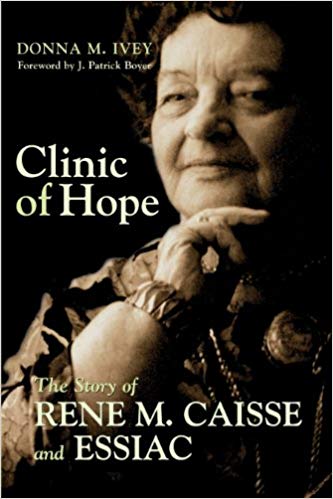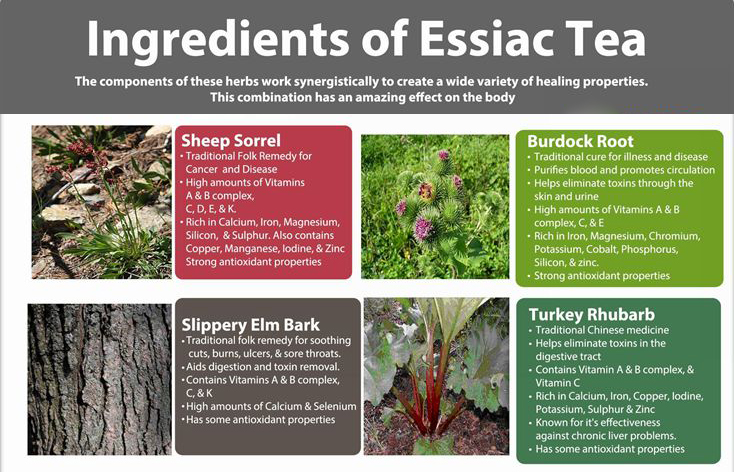On a lucky day in 1922, Canadian nurse Rene Caisse in
northern Ontario, Canada saw an elderly lady taking bath in a river; she had
some scar tissue on one of her entire breast. When asked this lady told her
that she developed cancer before 30 years and an Ojibway Indian herbalist told
her to make a tea out of certain herbs and drink it to heal her cancer. She had
no reoccurrence of cancer to that day. Rene noted down this miracle
formula.

In the ensuing years Nurse
Caisse refined and perfected the original formula. She tested various herbal
combinations on laboratory mice and on human cancer patients. Some versions of
Essiac had eight ingredients. The added ingredients are supposed to enhance the
product’s effectiveness and improve its taste. But she eventually used four
herbs to make this tea: burdock root,
sheep sorrel (whole herb including the roots), slippery elm and Turkey rhubarb.
She called the formula Essiac, which is her surname spelled backwards.
In 1924 she decided to test
the tea on her aunt who had stomach cancer and was given about six months to
live. Her aunt lived for another 21
years, without any cancer.
Rene Caisse later gave the
tea to her 72-year old mother who was diagnosed with inoperable cancer of the
liver, with only days to live. Her
mother also recovered and lived cancer free for another 18 years.
Eventually, she became so involved with her research that she focused all her time on the treatment of patients. Doctors all over Canada were sending their patients to her cancer clinic for the treatment. From 1934 to 1942 she successfully treated thousands of terminally ill cancer patients in her clinic in Bracebridge, Ontario. During this time many, many doctors, surgeons, and scientist visited her clinic, read case histories, and examined patients (Caisse).
Essiac Formula
The Recipe
| Herb | Oz. | g. | Form | Recipe % |
| Burdock root | 24 oz. | 680g | pea-size cut | 53% |
| Sheep sorrel with roots | 16 oz. | 453g | powdered | 36% |
| Slippery Elm bark | 4 oz. | 113g | powdered | 9% |
| Turkey rhubarb root | 1 oz. | 28.35g | powdered | 2% |
The preparation of Essiac is
as important as the formula itself. Essiac is a decoction. The decoction is
used to extract nutrients, minerals etc. from roots, bark or seeds by boiling
for ten minutes and then allowing the herbs to steep for several hours.
Entrepreneurs often sell Essiac imitations in tincture form or in gelatin
capsules; but neither form is true Essiac. Prepare the decoction as
follows.
- Using a stainless steel pot and lid, boil 15 g of herb mix in 1.5 liters of pure, unchlorinated water on high heat for ten minutes.
- Turn off heat, cover with lid and allow herbs to steep for 12 hours.
- Heat up tea to steaming, but not boiling. Allow herbs to settle for a couple minutes.
- Strain off hot liquid into sterilized bottles or canning jars. The remaining pulp can be used for healing poultices.
- Just store at room temperature. For long-term storage use the boiling water bath canning method and store in a cool, dark and dry place.
Make sure that the sheep sorrel you use is the small, wild variety of sheep sorrel and not a substitute like yellow dock or garden sorrel. Don’t use imported turkey rhubarb root. Many Essiac merchants are unaware of the quality of their herbs. The best way to insure that you’re getting true Essiac is to grow the herbs yourself; you can have control of product quality. Burdock root is harvested in the fall of the first year. Slippery elm bark is wild crafted and is easy to buy, but should also be homegrown so it doesn’t become endangered. Turkey Rhubarb is the only herb in Essiac that cannot be wild crafted. It is an attractive ornamental plant that can be grown in a flower bed or garden.
Treatment Dose: Recommended essiac
tea dosage is 30 ml of tea per day, taken preferably before sleep. Mix the tea
with 60 ml of warm or cold water. Double the dose of tea and water after a
week’s time. Do not eat or drink anything (except water) one hour before to one
hour after taking Essiac. Most people get used to the taste over time. Be aware
that chemo and radio can lessen the effects of essiac tea. In this case you can
increase the dose. Administer for at least 6 months after your test results
have returned to normal.
Ms. Caisse claims that Essiac
strengthens the immune system, improves appetite, relieves pain and improves
overall quality of life. It also shrinks tumors and prolongs the lives of
people with cancer. Essiac activates the body’s own natural defense. Most
patients experience less pain and overall improvement with the consistent use
of Essiac and some patients continue to live for many years in good
health. Essiac is anti-tumor,
anti-mutagenic and immune system enhancing. The real benefits of Essiac are
that it is a wonderful detoxifier and regenerates the liver and pancreas. I
summarize benefits as follows.
- Helps to cleanse the blood
- Normalize the enzymes
- Promotes cellular repair, and aids effective assimilation and elimination
- Regulates cholesterol levels by Transforming sugar into energy
- Makes bones, joints, ligaments, and lungs strong and less vulnerable
- Nourishes and stimulates the brain and nervous system
- Expels mucus clearing the lungs
- Helps eliminate heavy metal toxins in tissues
- Purifies the blood
- Increases red blood cell production
- Protects the body against radiation damage
- Helps destroy parasites in the digestive tract
- Prevents the buildup of fatty deposits in heart, kidney and liver
- Assists the liver in producing lecithin, which forms the myelin sheath that encapsulates the nerve fibers.

Rene also noticed that some
of her patients on Essiac with both cancer
and diabetes not only healed her cancer, but also claimed that her diabetes
disappeared. This result was so astounding that even Dr. Frederick Banting
(Insulin Fame) became interested in researching Essiac further with Ms. Rene
Caisse. He believed that Essiac’s detoxifying property was the main mechanism
that makes it helpful in diabetes. Secondly it is well known that Burdock root
has been used to reduce blood sugar for centuries. Dr. Banting proposed that
Essiac probably regenerate the pancreas’ ability to produce insulin and thus
treat diabetes, but the research never happened because Caisse was not ready to
close her cancer clinic. Even today people are using Essiac to improve their
blood sugar and many have gone off insulin entirely (Essiac Facts.com).
“March 2013 my wife was told
she had cancer of the colon that had spread to her liver which showed 8 tumors.
Her tumor marker for cancer was over 2200. She started chemo immediately and I
started her on Essiac Tea. The PET scan taken in October 2013 showed the cancer
in the colon was not showing up on the scan any more. Doctor said it was a
miracle!!! Only one tumor was found on the liver, 7 are gone. Her cancer marker
went from 2200 to 2.5 which is in the normal range. Doctor said in the
beginning they can’t cure her cancer, just may be prolong her life. Her doctor
was amazed at her progress, so we are going to continue the Essiac.”
Submitted by opn4bzns via YouTube – Nov. 17th 2013.
Burdock (Arctium lappa)
Health Benefits
Rich in potassium, iron, manganese, magnesium, zinc, calcium, selenium and phosphorus.
Vitamins folic acid, riboflavin, pyridoxine, niacin, Vit-E and Vit-C
Non-starch polysaccharides such as Inulin (is Prebiotic and helps reduce blood-sugar level, body-weight, and cholesterol levels in the blood), glucoside-lappin, mucilage
Diuretic, diaphoretic and a blood purifying agent.
Cancer – stops metastasis
Used in measles, arthritis, tonsillitis, throat pain, gout, rheumatism, snake bites, rabies, ulcers, dandruff, hair loss, acne, eczema, psoriasis and viruses like the common cold
Sheep Sorrel (Rumex acetosella)
Health Benefits
Rich in Vitamin A, B complex, C, D, E, and K
Anti-cancer, Anti-inflammatory, Antibacterial agent, Antioxidant, Diuretic, and immune booster.
Sheep sorrel has been used for cancer, fever, sinusitis, generalized inflammation and scurvy
Slippery Elm (Ulmus rubra)
Health Benefits
Mucilage – sore throats and suppresses coughs, laxative, and binds toxins.
Fatty acids, tannins, and sterols – antioxidant and anti-inflammatory.
Used in Cancer, Skin wounds and burns, Sore throat, Cough, Gastro esophageal Reflux/Heartburn, ulcerative colitis and Crohn’s disease, Irritable Bowel Syndrome, Diarrhea, Psoriasis and other skin conditions (Essiac Facts.com).
Turkish Rhubarb (Rheum palmatum)
Health Benefits
Mucilage- sore throats and suppresses coughs, laxative, and binds toxins.
Fatty acids, tannins, and sterols – antioxidant and anti-inflammatory.
Used in Cancer, Skin wounds and burns, Sore throat, Cough, Gastro esophageal Reflux/Heartburn, ulcerative colitis and Crohn’s disease, Irritable Bowel Syndrome, Diarrhea, Psoriasis and other skin conditions






